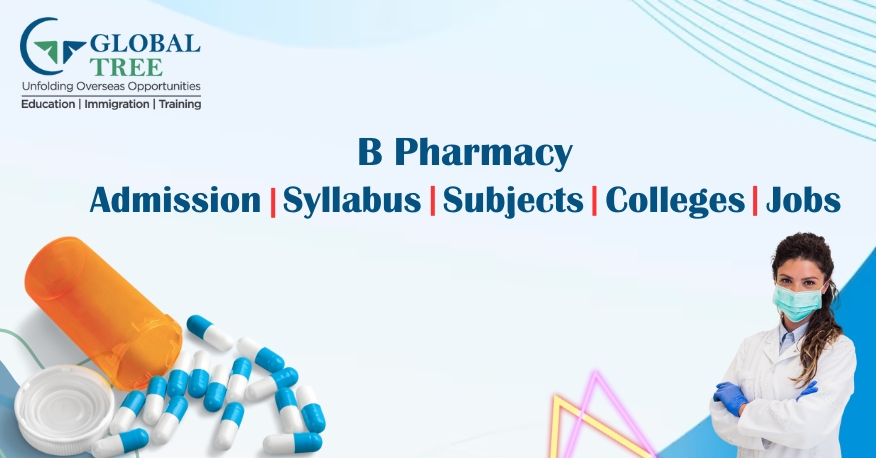B Pharmacy Course – Eligibility, Admissions 2023 & Colleges

- About B Pharmacy Course
- B Pharmacy Course Types & Duration
- How to get into a B Pharmacy course?
- B Pharmacy Syllabus & Subjects
- Top B Pharmacy Colleges Abroad
- Tuition Fees for the B Pharmacy Course
- B Pharmacy scholarships to Study Abroad
- Average salaries for a B Pharmacy Course
- After B Pharm What can I Do?
- Abroad Jobs for People with a B.S. in Pharmacy
- B Pharmacy Course vs. Other Courses in the Same Field
- FAQs about the B Pharmacy Course
About B Pharmacy Course
The field of pharmacy is an important part of the healthcare business. It focuses on how to use medicines safely and effectively. The Bachelor of Pharmacy (B Pharmacy) program stands out among the different pharmacy schools because it is a complete academic path for people who want to work as pharmacists. In this blog, we'll talk in-depth about the B Pharmacy course. We'll talk about its goals, how to get in, curriculum, top schools, fees, and future prospects.
About the B Pharmacy Course: The B Pharmacy course gives students the information and skills they need to become professionals in the field of pharmacy. It includes the study of pharmaceutical science course abroad, such as finding new drugs, making them, making sure they are of good quality, and giving them to the right people. This course is great for people who care a lot about medicine, science, and the health of their patients. By getting a B.S. in Pharmacy, students can learn a lot about pharmaceutical studies and get ready for a variety of careers in the pharmacy field.
B Pharmacy Course Types & Duration
a) Full-Time: Full-time B Pharmacy programs usually last four years and teach students everything they need to know about pharmacy. These programs give students a structured education and hands-on training to help them learn more and get better at what they already know.
b) Part-Time: Part-time Bachelor of Pharmacy (B. Pharm.) programs are for people who already have other obligations or who want to learn on their own time. Students can go to school through these programs even if they have to work or take care of other duties.
c) Diploma: Diploma studies in pharmacy usually last between one and two years and are shorter. They focus on teaching the basic knowledge and skills that are needed for entry-level jobs in the area of pharmacy.
(Read more: List of top master’s programs in health care study abroad)
How to get into a B Pharmacy course?
a) Eligibility: To be eligible for the B Pharmacy course, candidates usually need to have a science background, such as Physics, Chemistry, Biology/Mathematics and have finished their 10+2 schooling. Different educational institutions may have different rules about who can apply.
b) Entrance tests: To get into the B Pharmacy course, many universities and colleges have entrance tests. Common entry exams include the Pharmacy Aptitude Test (PAT) and the Graduate Pharmacy Aptitude Test (GPAT) at the national level, and entrance exams at the state level.
c) Tips for Entrance tests: Candidates should study pharmaceutical sciences, chemistry, biology, and general aptitude to do well on entrance tests. Performance can be greatly improved by practicing often, managing time well, and turning to relevant study materials.
B Pharmacy Syllabus & Subjects
The B Pharmacy course syllabus covers a wide range of topics to give students a complete knowledge of pharmaceutical sciences and prepare them for a career in pharmacy. Here are some of the most important things that are usually on the list:
Pharmaceutical Chemistry: It is the study of organic and inorganic chemistry as it applies to the creation, synthesis, and analysis of drugs. Students learn about drug ingredients, how they are made chemically, and how they affect living things.
Pharmacology: It is the study of how drugs affect the human body and how they can be used to help people. Students learn about how drugs work, how they work, how they connect with other drugs, and how they can hurt people. Choose the best colleges to study Pharmacology course abroad.
Pharmaceutics: This is the study of how pharmaceutical goods are made and how they work. It talks about things like dosage forms, drug delivery systems, pharmaceutical formulas, and production methods.
Pharmacognosy is the study of natural drugs made from plants, animals, and other things found in nature. Students learn how to find, separate, and study active chemicals that come from natural sources.
Pharmaceutical: microbiology is the study of microorganisms and what part they play in making drugs, making sure they are safe, and making sure quality control is done. Students learn about how pharmaceutical goods can be contaminated by microbes, how to sterilize them, and how to stop microbes from growing in them.
Clinical Pharmacy: Clinical pharmacy is the use of drug understanding to take care of patients. Students learn about counselling patients, managing medication therapy, how drugs work with each other, and how to do a drug utilization review.
Pharmaceutical Analysis: Pharmaceutical analysis is the study of the techniques and methods used to analyze the quality, purity, and effectiveness of pharmaceutical goods. Students learn about analytical methods like spectroscopy, chromatography, and others.
Aside from these core topics, the B Pharmacy course may also include electives like pharmaceutical marketing, pharmaceutical regulatory affairs, pharmaceutical biotechnology, and pharmaceutical management.
Important B Pharmacy Books
Students are urged to use important books and other study materials that their universities or colleges have suggested doing well in the course. These resources give students in-depth information and help them understand the ideas well.
"Remington: The Science and Practise of Pharmacy," "Pharmaceutical Chemistry" by Ravi Shankar,
And "Pharmacology" by Rang and Dale are all books that B Pharmacy students are often told to read.
By the end of the B Pharmacy course, students have a solid understanding of pharmaceutical sciences, which gives them options for careers in the field of pharmacy. Graduates of the B Pharmacy course can work as a neighborhood pharmacist, a pharmacist in a hospital, a clinical research associate, a pharmaceutical sales representative, or go on to higher education. Choose the best countries to study abroad for higher education.
Top B Pharmacy Colleges Abroad
a) Best Colleges for Bachelor of Pharmacy Courses Abroad:
- United States, Massachusetts Institute of Technology (MIT)
- Cambridge University, United Kingdom
- ETH Zurich
- Switzerland's Swiss Federal Institute of Technology
- Tokyo University, Japan
- Canada's University of Toronto
b) Best Colleges to Get a Master's in b. Pharmacy Abroad:
- Harvard University in the U.S.
- The University of Oxford in the UK,
- Singapore National University, Singapore
- Melbourne, Australia's University of Melbourne
- Canada's University of British Columbia
Tuition Fees for the B Pharmacy Course
Fees for the B Pharmacy course vary by country, university, and program. Taking the B Pharmacy course can be a big investment in general. The fees run from a few thousand to tens of thousands of dollars per year. Students may also have to pay for things like housing, books, and living fees.
B Pharmacy scholarships to Study Abroad
Students who want to study the B Pharmacy course abroad can get help from a number of scholarships and financial aid programs. These scholarships can help ease the cost of learning abroad and make it easier to do so. The Fulbright Scholarship, it is one of the best Study Abroad scholarships for overseas education, the Commonwealth Scholarship, and other government-funded scholarships in places like the United States, the United Kingdom, and Australia are some of the most famous scholarships for international students. Also, many universities have their own scholarships for b pharmacy students that are based on ability or need.
Average salaries for a B Pharmacy Course
The average pay for a B Pharmacy graduate depends on things like experience, job role, location, and type of work. In general, people who work in pharmacies get good pay. Depending on the country and area, chemists who are just starting out can expect to make an average of $90,000 to $120,000 per year. Pharmacists can move up to higher-paying jobs like pharmaceutical researchers, experts, or managers as they gain experience and specialize.
After B Pharm What can I Do?
B Pharmacy Course is one of the best study abroad program for a better future career. After finishing the B Pharmacy course, graduates have a number of career choices to choose from. Some popular choices are:
Masters: Graduates can choose postgraduate programs like Master of Pharmacy (M.Pharm), Doctor of Pharmacy (PharmD), or specialized training in areas like clinical pharmacy, pharmaceutical technology, or regulatory affairs.
Pharmacist jobs: Graduates can work as community pharmacists, hospital pharmacists, industrial pharmacists, or study pharmacists. They are very important when it comes to giving out medicines, making sure patients are safe, and giving pharmacy care.
Pharmaceutical industry: Graduates can look for jobs in pharmaceutical companies, drug manufacturing companies, research and development organizations, and regulatory bodies. They can work in places like drug development, quality control, pharmacovigilance, or medical affairs.
Entrepreneurship: Some B.Pharm. graduates decide to start their own pharmacies, such as store pharmacies, pharmacies that make their own medicines, or online pharmacies.
Teaching and research: Graduates can work as lecturers, professors, or research scientists in universities, research institutes, or pharmaceutical businesses.
(Read more: List of top countries to study and work abroad for Indian students)
Abroad Jobs for People with a B.S. in Pharmacy
People with a B.S. in Pharmacy have a wide range of job options both at home and abroad. Some famous jobs abroad for people with a B.S. in pharmacy are:
Clinical Pharmacist, Hospital Pharmacist, Industrial Pharmacist, Regulatory Affairs Specialist, Pharmaceutical Research Scientist, Pharmaceutical Sales Representative, Drug Safety Associate, Quality Control Analyst, Pharmacy Manager, and Medical Science Liaison.
B Pharmacy Course vs. Other Courses in the Same Field
B Pharmacy is similar to studies like PharmD, Bachelor of Science in Pharmacy, and Doctor of Pharmacy.
Pharmacy degree. But each course is different and has its own strengths and job prospects. While PharmD focuses more on clinical practice and patient care, B Pharmacy focuses on giving students a good foundation in pharmaceutical sciences. With a Bachelor of Science in Pharmacy, you learn more about pharmaceutical studies, like how to find and make new drugs. A diploma in Pharmacy is a shorter course that focuses on the basic skills and knowledge needed for entry-level jobs in the area of pharmacy.
(Read more: Top In-demand Occupations abroad)
FAQs about the B Pharmacy Course
a) How long does the B Pharmacy training last?
The B Pharmacy course is usually a four-year program for first-year college students.
b) Can I take the B Pharmacy course by learning from home?
Due to the practical and hands-on nature of pharmacy education, the B Pharmacy study is mostly taught on campus. But some colleges may offer options for "hybrid" or "blended" learning that combines online classes with hands-on training in person.
c) What are the most important skills you need to succeed as a chemist?
For a job in pharmacy to go well, you need to know a lot about science, pay attention to details, have good communication and people skills, be able to think critically, and treat patients in an ethical way.
d) Does the B Pharmacy course offer chances for study and specialization?
Yes, the B Pharmacy study at many universities gives students the chance to do research and specialize. Students can learn about things like pharmaceutical technology, clinical pharmacy, pharmacovigilance, pharmaceutics, and drug development.
(Read more: Things you must know about Working Abroad)
e) Can people with a B.S. in pharmacy work abroad?
Yes, people with a B.S. in pharmacy have the chance to work abroad. But the exact rules and processes for getting a license may be different from one country to the next. To work as a chemist in a foreign country, graduates may need to meet more requirements or take tests.
In conclusion, the B Pharmacy course is a complete academic programme that gives students the knowledge and skills they need for a rewarding job in pharmacy. With a strong background in pharmaceutical sciences, graduates can work with patients, do study, work in industry, or start their own business. By taking the B Pharmacy course, students can start a rewarding career in the area of pharmacy and help patients all over the world get better care.









